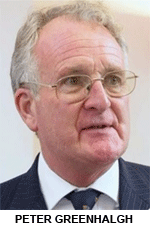Eroding linguistic inheritance
 In retrospect, the decision taken by free India’s leaders to continue to use English as the national medium of professional communication after independence was wise. It not only enabled communication between the 28 linguistically demarcated states of the Indian Union, but over the past six decades has also been universally accepted as the main language of business and commerce, both within India and internationally. However, English everywhere is becoming the victim of its own success. Strong regional dialects which are difficult to understand in the UK itself, and foreign accents are eroding the fundamental purpose of a common international language — comprehension, clarity and accuracy of communication.
In retrospect, the decision taken by free India’s leaders to continue to use English as the national medium of professional communication after independence was wise. It not only enabled communication between the 28 linguistically demarcated states of the Indian Union, but over the past six decades has also been universally accepted as the main language of business and commerce, both within India and internationally. However, English everywhere is becoming the victim of its own success. Strong regional dialects which are difficult to understand in the UK itself, and foreign accents are eroding the fundamental purpose of a common international language — comprehension, clarity and accuracy of communication.
There is an urgent need to establish and teach standardised English speech and pronunciation globally. The most universally comprehensible form of spoken English (also generally regarded as the most pleasing and prestigious) is what used to be called BBC English until the virus of political correctness infected that organisation, and regional and ethnic minority dialects were accepted by it for broadcasting news and narratives.
That the erosion of classic BBC English, otherwise known as received pronunciation (RP), is a profound disservice, was recently stressed by India-born Dr. Samir Shah, OBE, the BBC’s former head of current affairs and member of the corporation’s executive board. “BBC standards,” he said, “are dropping to get ethnic minorities on air. The problem is they lower the barrier. It is done with the best of intentions, but for someone like me, from an ethnic minority, my heart sinks. It is just embarrassing.”
Most countries worldwide have adopted standard pronunciation for their national languages for comprehensibility and clarity. Some standard languages are official, others are a matter of general acceptance rather than regulation, but what most of them have in common is that they represent the cultivated speech of educated people in the national capital and are readily understood by the entire population. Standard pronunciation is generally used on quality national broadcasting stations, and carries great prestige, as is certainly the case with standard English (whatever the politically correct may like to pretend). Those aspiring to climb social and professional ladders voluntarily learn to use it, and in India this means learning RP English. (India’s Dalit communities showed how well they understood this when they erected a temple to English, the goddess of social mobility).
It is unfortunate, therefore, that English is taught in India as a language of communication only until the age of 12-13, after which it becomes just another school subject like maths or geography. The ability to speak standard or RP English fluently and confidently, with a clear and readily comprehensible accent, is an essential complement to, and should be a component of all higher and professional education — engineering, administration, diplomacy, politics, architecture, broadcasting, theatre, the armed forces, banking, industry, commerce, science, IT, teaching, and certainly the professions.
Individuals can be intellectually outstanding and possess strings of degrees and professional qualifications, but if they cannot communicate their thoughts, arguments and knowledge easily, clearly, confidently and attractively in good standard English, they risk failing to achieve their full potential in an increasingly competitive world. The cultivation of English speech and pronunciation skills should be a matter of continuing education in senior classes of schools, in colleges and universities, and in the training departments of all reputed companies and professional firms. And if this training is not provided institutionally, aspiring professionals and students would be well advised to seek private tuition or sign up for a reputable audio-visual distance learning course (the latter having the advantage that the student can be sure the tutors will be well-educated and well-spoken).
No one would find it acceptable for good music to be played on out-of-tune instruments, or for a poorly cooked meal to be sloppily presented at a good restaurant. Nor would anyone dare tamper with the rules and traditions of sport. Yet the most precious gift of England to the world — its rich and subtle language — is being degraded in its homeland in line with the depressing decline of teaching standards generally, a decline that produces thousands of functionally illiterate, innumerate, inarticulate and frequently unemployable school-leavers, their lives ruined by years of free, compulsory and useless state education.
Britain’s future has been sacrificed on the altar of so-called political correctness (and there are siren voices urging India to follow this same disastrous educational path). England has bequeathed its glorious language to India, and however decadent England may be in letting its own family silver become tarnished, rising India would be well advised to cherish this valuable linguistic inheritance, to keep it polished, and to encourage its youth to excel in it as befits a great nation rapidly transforming into one of the world’s most important economic and political powers.
(Dr. Peter Greenhalgh is a UK-based language expert and former academic at the universities of Cambridge and Cape Town)














Add comment